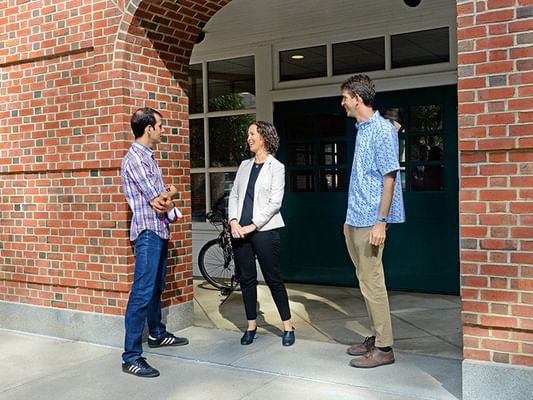- Undergraduate
Bachelor's Degrees
Bachelor of ArtsBachelor of EngineeringDual-Degree ProgramUndergraduate AdmissionsUndergraduate Experience
- Graduate
Graduate Experience
- Research
- Entrepreneurship
- Community
- About
-
Search
All Thayer News

Leading Thoughts: Design at Dartmouth
Dec 01, 2021 | by Alexis R. Abramson | Dartmouth Engineer
This new conversation series aims to amplify our community’s voices and the human-centered work that drives the solutions to some of the world’s most complex challenges. To kick off the series, Dean Alexis Abramson spoke with professors Sol Diamond and Eugene Korsunskiy, co-leaders of the new Design Initiative at Dartmouth.

Dean Abramson (center) talks with professors Eugene Korsunskiy (left) and Sol Diamond (right). Photo by Kathryn Lapierre.
At Dartmouth, our distinctive human-centered approach to engineering empowers students to learn, discover, and innovate with a singular purpose: improving lives and bettering our world. As dean, I have a unique vantage point to witness how we live out these values every day, both within Thayer and across Dartmouth. This new conversation series aims to amplify our community’s voices and the human-centered work that drives the solutions to some of the world’s most complex challenges. We’re kicking off the series with Professors Sol Diamond and Eugene Korsunskiy, co-leaders of the new Design Initiative at Dartmouth who work to bring the power of design thinking and human-centered design to all corners of campus.
What does “human-centered engineering” mean to you?
SOL DIAMOND: Human-centered engineering requires us to take a fresh look at the role of engineering in society and the profound impact of our work—beyond stakeholders, to surrounding communities and to society at large. It brings in questions about morality, ethics, and justice in ways that engineering alone may neglect.
How does design fall under the umbrella of human-centered engineering?
EUGENE KORSUNSKIY: Everything around us, all our experiences, is designed. If everything we come into contact with is created by humans for humans, then we are agents. As agents, we have the power to engage in this critical examination and improve the lives and experiences of all creatures on the planet through engineering and the design process.
Can you think of recent examples where you’ve seen this human-centered design process play out?
DIAMOND: Students in ENGS 89/90 partnered with a company to design an optical sensor to monitor the effectiveness of ultraviolet light in sterilizing the air in HVAC systems. The team started with the technical specifications and then considered the broader impact, engaging in a different kind of conversation. What HVAC systems are suitable for outfitting or retrofitting with UV purification technology? Can it work on aging systems in underfunded communities? Who ultimately benefits? Who is left out? The students asked hard questions. This process profoundly influenced their understanding of the role they play as engineers.
What’s the most important thing you want students to take away?
KORSUNSKIY: I want students to walk away with a steadfast commitment to collaboration across disciplines. No matter how smart or deep an expert you are, your one brain is not going to be enough on its own. Engineers need anthropologists, marketing experts, doctors, and environmentalists. At these intersections, you generate new, exciting ideas.
DIAMOND: I want students to ask, “What is the role of this technology in society? What are the ramifications of our work? How do we make our world truly better for everyone?” As engineers, we follow a professional code of ethics, but human-centered engineering elevates this beyond mere compliance to deep reflection. I want students to start a habit of personal and professional reflection that carries through their careers.
It’s 2030. The Design Initiative at Dartmouth is wildly successful. What does that look like?
KORSUNSKIY: Every person at Dartmouth—students, faculty, staff—sees themself in this initiative. Dartmouth becomes a place where design thinking, engineering, and the liberal arts exists as a beautiful tripartite.
DIAMOND: Dartmouth is recognized as the leading brain trust for design, a full-solution space for society’s complex challenges that leverages the sciences, arts, business, medicine, and the humanities.
—Alexis Abramson is the Dean of the Thayer School of Engineering at Dartmouth.
For contacts and other media information visit our Media Resources page.
